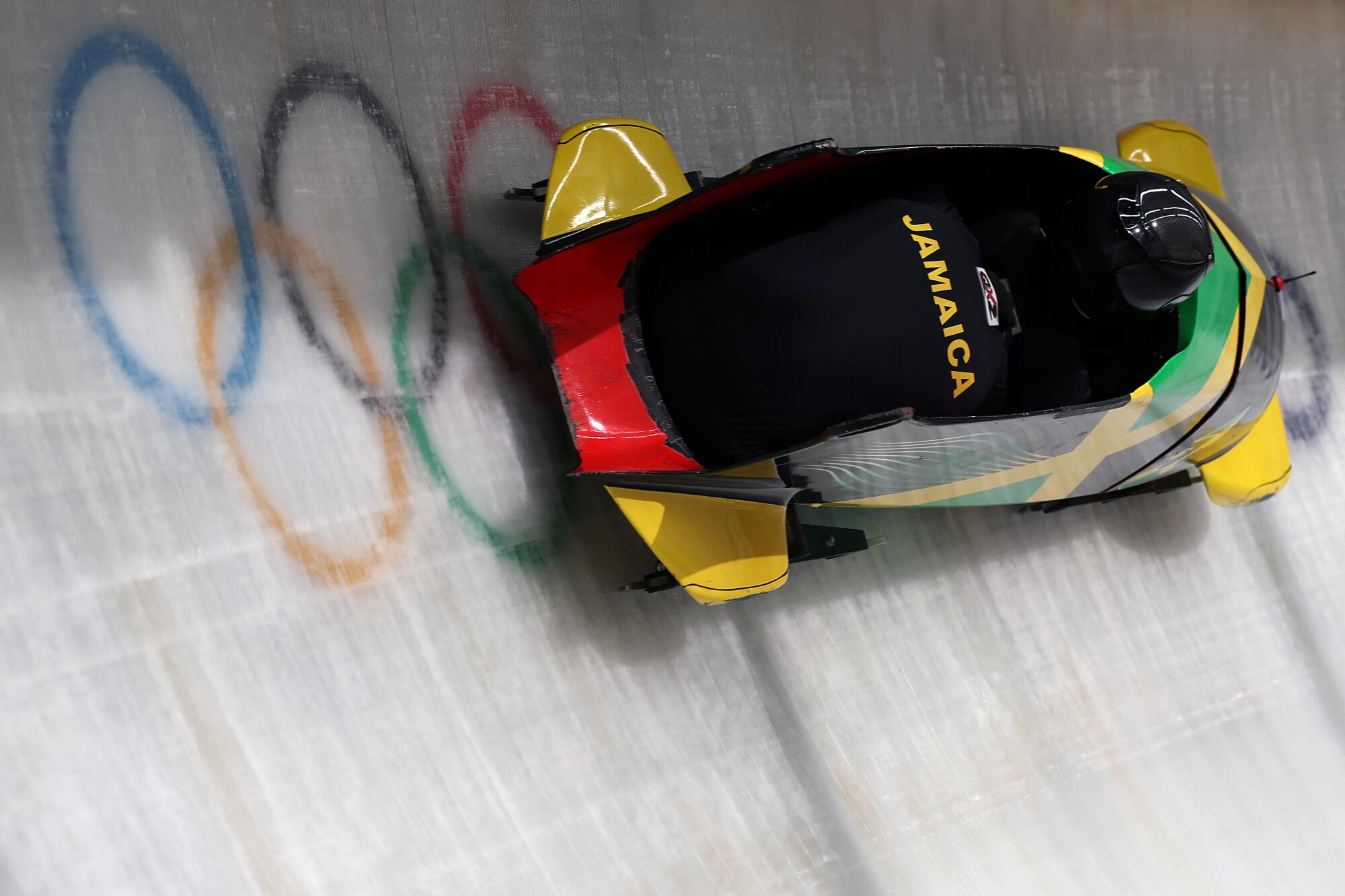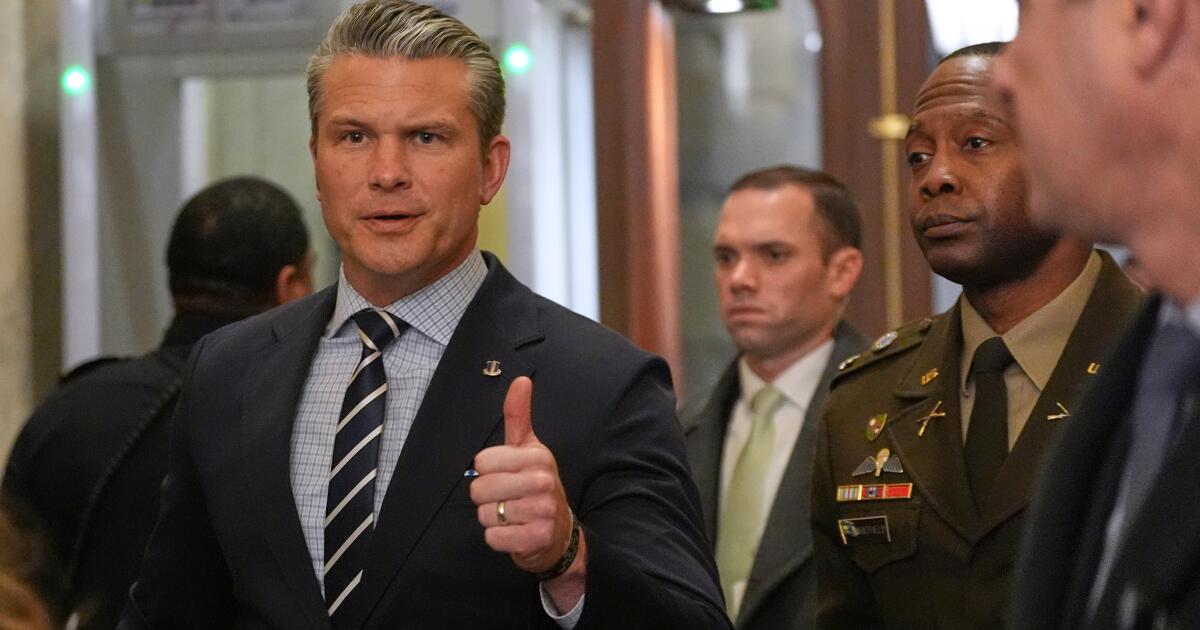Caribbean sprinters are hoping to transform Winter Olympic bobsledding
CORTINA D’AMPEZZO, Italy — Axel Brown, the pilot of Trinidad and Tobago’s bobsled team, came to the Milan-Cortina Winter Games with a simple goal.
“Just don’t come last,” he said. “We know that there is a 0% chance of us contending for medals. It doesn’t matter if we have the absolute best day we’ve ever had.
“That’s just the reality of it. It’s not defeatist, it’s not negative. It’s just being realistic.”
But it’s also realistic to believe that Trinidad, just by being in the competition, is furthering something of a revolution in the Winter Olympics in general, and in bobsledding in particular.
When Jamaica debuted in the event in 1988, it was so novel it inspired the 1993 Disney movie “Cool Runnings.” Now, it’s no longer unusual to see a team from a tropical climate competing in the Winter Games; there are 11 Caribbean and South American countries, plus Puerto Rico, competing in the Milan-Cortina Olympics.
When the bobsled competition in Cortina begins Sunday, Trinidad will have teams in the two- and four-man events for the first time, while Jamaica will compete in both those events as well as the monobob. Brazil will also be there.
And Brown says it’s only a matter of time — and money — before others join and start contending for medals.
“There’s a very deep talent pool in Caribbean bobsled, one that could make a world-class bobsled program without a doubt,” he said.
That’s because bobsled races are often won or lost at the start, where speed, explosive power and acceleration are vital in getting the 400-pound sled moving. Sprinters have all those traits.
“Even more specific, it’s usually big sprinters,” said Curtis Tomasevicz, a former football player at Nebraska who won Olympic gold and silver medals in the bobsled before becoming a coach with the U.S. team. “They’ve got just an athleticism that is very applicable to pushing sleds.”

Jamaica takes part in a training run at the Milan-Cortina Olympic Games on Friday.
(Al Bello / Getty Images)
And the best sprinters in the world come from the Caribbean — so many, in fact, that trying to make a national team for the Summer Olympics can seem like trying to win the lottery. The Winter Games offer another path.
“In Trinidad and Tobago, there’s a wealth of sprinting talent. So an athlete that in another nation may be the best in the country doesn’t necessarily get a look in Trinidad,” Brown said. “What we’ve been able to do is kind of give those athletes that were maybe on the fringe an option at achieving all of their sporting goals, just doing it in a different way.
“They’ve been training for bobsled their entire lives. They just didn’t know it.”
The transition can be difficult just the same. The first time Trinidad’s Micah Moore, a former sprinter, rode a sled, he said he thought he was going to die.
“I was scared out of my mind,” he said. “I was legitimately feeling, ‘I just want this to be over.’
“After that feeling came off, I was like, ‘Let’s go again.’ It’s an adrenaline rush. There’s no amount of words I could put to say how it felt in that moment.”
If Caribbean bobsledders are deep in talent, what they lack are world-class facilities and funding. In the former they’re hardly alone, said Tomasevicz.
“There are a lot of other nations that obviously don’t have a home track to practice on,” he said. “Even Great Britain, they don’t have a track in their country. So they have to spend time in other nations actually training for the sport.”
Trying to find the money is an even bigger problem — especially for Trinidad, which Brown said was the only team in Cortina that didn’t receive government funding.
“Bobsled is an expensive sport,” Trinidad’s Xaverri Williams said. “We’ve been trying to negotiate with our [national Olympic committee], our Ministry of Sport, reaching out to individuals who are willing to help us.”
Trinidad doesn’t even have a decent sled; it will be racing Sunday with an old secondhand one the team owes money on. Getting a new one that would be competitive with the best in the world could easily cost $250,000 or more.
“You need the funds to further develop the broader program, the recruitment, the [research and development] of the equipment. Everything that there is involved in bobsled,” said Brown, was born in England to a Trinidadian mother, which allows him to compete for the island in the Olympics. “And you need to be able to sustain that.”
You also need the belief that it’s possible to succeed in an icy winter sport even though you’re from a sun-washed country where the average annual temperature is 80 degrees. Jamaica provided that.
“We do in fact look up to them,” Williams said. “When those guys initially slided, it was an eye-opener for the rest of the world, that a Caribbean nation could actually compete. They inspired us.”
“I’m very proud of that,” said Chris Stokes, a four-time Olympian and member of the “Cool Runnings” team who is now president of the country’s bobsled federation.
The next step is to outgrow the novelty and become medal contenders, something Stokes says Jamaica can do by the 2034 Games in Salt Lake City. A top-12 finish in Cortina would keep them on pace to do that, he said.
As for Trinidad and Tobago, Brown said they faced so many challenges just getting to Italy that they considered it a victory when they checked into the Olympic village.
“Our gold medal,” he said “was qualifying.”

